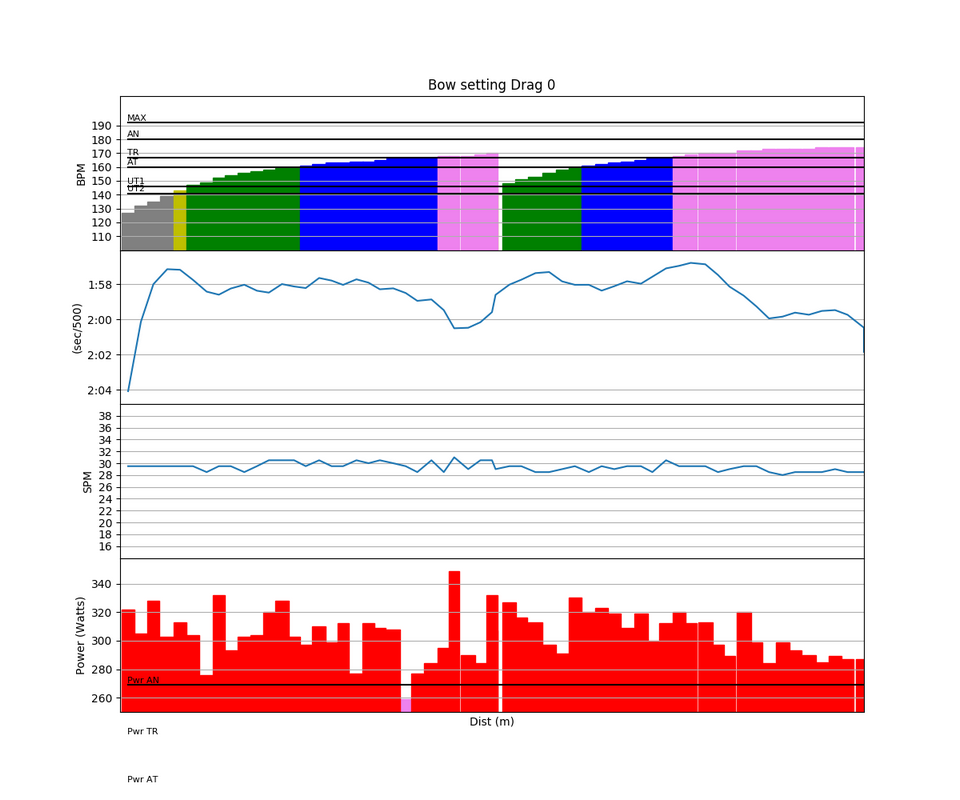There was no time for a long outing today. There wasn’t even the possibility, because the Youth regatta was in full swing and the lake was closed for other rowers.
I wanted to test some foot stretcher settings, so I figured that it was OK to use a remote corner of the lake that is outside the main traffic patterns.
There has been some discussion on rec.sport.rowing on how to set the footstretcher, and about speed gains to be achieved by setting the foot stretcher towards the stern (larger catch angle, more efficient stroke, etc). I decided to do an experiment.
Row 2x250m (one in each direction, with 250m “rest” to turn) with each foot stretcher setting. Try to hold 300W as closely as possible. Measure total time over 500m. Running start. Stroke rate free.
Today there was almost no wind and the water was flat.
The 300W is submaximal, which makes it easy to hold steady and focus on technique. So after a few minutes of warming up, I set off for the first set of 2x250m. Then I changed the footstretcher as much as possible towards the bow (where I was limited by my backstops which I didn’t want to change OTW), and repeated the experiment.
I did have the feeling that there was slightly more “light wind” than in the first run, though. This may have destroyed the experiment.
The second set with the bow-wards setting felt weird, and I had a lot of room between my belly and my scull handles at the tap-down. Here are the overview graphs:
Here are the Empower force curves:
So only a 5 degree shift in catch and finish angles for what feels very different in the boat. The stroke felt much lighter with the bow-ward setting. Now on to the verdict.
For completeness, the SpeedCoach itself reports 1:58.8 time at 29.0 spm and 301W for the “normal” setting, and 1:59.0 at 29.0spm and 306W with the bow-ward setting.
So almost the same total time with a power difference of 1% (5W at most). This is in the order of magnitude that I was expecting, and the question is whether the measurement system is accurate enough to measure such small differences.
But it was fun to do, and I am going to stick with my “normal” setting with the larger catch angles.
We use cookies to ensure that we give you the best experience on our website. If you continue to use this site we will assume that you are happy with it.Ok
May 13 2017
Saturday – Experimenting with footstretcher setting
There was no time for a long outing today. There wasn’t even the possibility, because the Youth regatta was in full swing and the lake was closed for other rowers.
I wanted to test some foot stretcher settings, so I figured that it was OK to use a remote corner of the lake that is outside the main traffic patterns.
There has been some discussion on rec.sport.rowing on how to set the footstretcher, and about speed gains to be achieved by setting the foot stretcher towards the stern (larger catch angle, more efficient stroke, etc). I decided to do an experiment.
Row 2x250m (one in each direction, with 250m “rest” to turn) with each foot stretcher setting. Try to hold 300W as closely as possible. Measure total time over 500m. Running start. Stroke rate free.
Today there was almost no wind and the water was flat.
The 300W is submaximal, which makes it easy to hold steady and focus on technique. So after a few minutes of warming up, I set off for the first set of 2x250m. Then I changed the footstretcher as much as possible towards the bow (where I was limited by my backstops which I didn’t want to change OTW), and repeated the experiment.
I did have the feeling that there was slightly more “light wind” than in the first run, though. This may have destroyed the experiment.
The second set with the bow-wards setting felt weird, and I had a lot of room between my belly and my scull handles at the tap-down. Here are the overview graphs:
Here are the Empower force curves:
So only a 5 degree shift in catch and finish angles for what feels very different in the boat. The stroke felt much lighter with the bow-ward setting. Now on to the verdict.
My “normal” setting (larger catch angle):
Workout Summary - media/20170513-144854-Sanders SpeedCoach 20170513 0929amo.csv
--|Total|-Total-|--Avg--|-Avg-|Avg-|-Avg-|-Max-|-Avg
--|Dist-|-Time--|-Pace--|-Pwr-|SPM-|-HR--|-HR--|-DPS
--|00500|01:58.8|01:58.7|302.9|29.4|159.1|171.0|08.6
W-|00500|01:58.8|01:58.8|302.9|29.3|159.1|171.0|08.6
R-|00000|00:00.0|00:00.0|000.0|00.0|000.0|171.0|00.0
Workout Details
#-|SDist|-Split-|-SPace-|-Pwr-|SPM-|AvgHR|MaxHR|DPS-
00|00250|01:00.8|02:01.6|306.9|29.6|154.5|167.0|08.3
01|00250|00:58.0|01:56.0|298.7|29.1|163.9|171.0|08.9
And the “bow-ward” setting (shorter catch angle):
Workout Summary - media/20170513-144939-Sanders SpeedCoach 20170513 0938amo.csv
--|Total|-Total-|--Avg--|-Avg-|Avg-|-Avg-|-Max-|-Avg
--|Dist-|-Time--|-Pace--|-Pwr-|SPM-|-HR--|-HR--|-DPS
--|00500|01:59.0|01:58.9|304.4|29.4|161.5|174.0|08.6
W-|00500|01:59.0|01:59.0|304.4|29.4|161.5|174.0|08.6
R-|00000|00:00.0|00:00.0|000.0|00.0|000.0|174.0|00.0
Workout Details
#-|SDist|-Split-|-SPace-|-Pwr-|SPM-|AvgHR|MaxHR|DPS-
00|00250|00:59.8|01:59.6|304.3|29.7|157.3|170.0|08.4
01|00250|00:59.2|01:58.4|304.5|29.0|165.7|174.0|08.7
For completeness, the SpeedCoach itself reports 1:58.8 time at 29.0 spm and 301W for the “normal” setting, and 1:59.0 at 29.0spm and 306W with the bow-ward setting.
So almost the same total time with a power difference of 1% (5W at most). This is in the order of magnitude that I was expecting, and the question is whether the measurement system is accurate enough to measure such small differences.
But it was fun to do, and I am going to stick with my “normal” setting with the larger catch angles.
By sanderroosendaal • Uncategorized • 1 • Tags: experiment, OTW, rigging, rowing, single